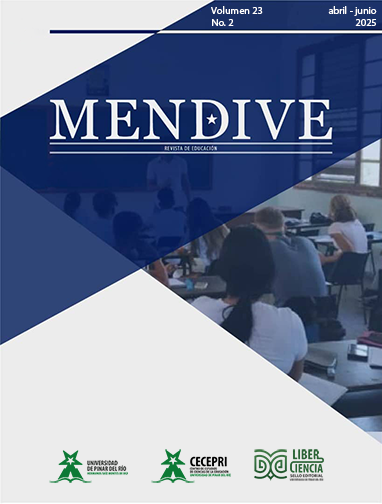Educational Sciences: an approach to educational trends in Latin America
Main Article Content
Abstract
Determining whether the Educational Sciences form a unified structure and function, or whether, on the contrary, they constitute a heterogeneous conglomerate artificially united for external reasons, constitutes a broad field of discussion, especially when analyzing what disciplines such as Group Dynamics, History of Education, Economics, or Educational Biology may have in common. This issue becomes more complex when considering the diversity of settings in which educational events manifest themselves -family, community, mass media, school- where education is conceived either consciously and purposefully, or spontaneously. The objective was to systematize educational trends in Latin America to allow for a critical assessment of the presentations from the symposium "Pedagogy of Higher Education" at the University Congresses, which have served as a scientific laboratory for the Ministry of Higher Education (MES) to address the changes required by Cuban Higher Education. The methods used included a qualitative approach, the phenomenological method, and scientific systematization, which made it possible to interpret pedagogical discourses and extract regularities. Among the results, a trend toward the transformation of pedagogical models, the strengthening of the social role of the university and the integration of teaching, research, and outreach was identified. The main conclusions were that, despite their diversity, the Education Sciences can be articulated from a transdisciplinary approach and that the symposia have been key to project educational policies in the Cuban and Latin American contexts.
Downloads
Article Details

This work is licensed under a Creative Commons Attribution-NonCommercial 4.0 International License.
References
Jandrić, P., & Ford, D. R. (Eds.). (2022). Postdigital Ecopedagogies: Genealogies, Contradictions, and Possible Futures. Springer International Publishing. https://doi.org/10.1007/978-3-030-97262-2
Boris, G. (1996). Marxismo y nueva historia en: La historia y el oficio del historiador. Editorial Ciencias Sociales. https://z-library.do/book/22418707/39e495/filosof%C3%ADa-de-la-educaci%C3%B3n.html
Chávez Rodríguez, J. A., Fundora Simón, R. A., & Pérez Lemus, L. (2011). Filosofía de la educación (2da ed.). Editorial Pueblo y Educación. https://z-lib.id/book/filosofa-de-la-educacion
Chávez, J., & Pérez, L. (2015). Fundamentos de Pedagogía General. Parte I. Texto para la Carrera Pedagogía-Psicología. Editorial Pueblo y Educación. https://sibi.upn.mx/bib/184870
Durkheim, E. (1974). El Sitio de Ciencias de la Educación. Vocabulario de ciencias de la Educación. En Educación y sociología. Schapire. https://www.planetadelibros.com/libro-educacion-y-sociologia/115433
Fals Borda, O., & Freire, P. (2015). Investigación acción participativa: Bases para una praxis de liberación. Revista Latinoamericana de Estudios Educativos, 5(2), 98-115. https://doi.org/10.1234/rlee.v5i2.2015
Freire, P. (1970). Pedagogía del oprimido. Siglo XXI Editores. http://archivovivopaulofreire.org/images/Libros/Pedagogia-del-Oprimido.pdf
Gazzola, A. L., & Didriksson, A. (2008). Las reformas de la educación superior en América Latina. En N. Fernández Lamarra (Ed.), La educación superior en América Latina y el Caribe: Perspectivas comparadas (pp. 267-291). Avaliação. https://sedici.unlp.edu.ar/handle/10915/15291
Olssen, M., et al. (2023). Decolonial scientific education to combat `science for domination'. Cultural Studies of Science Education. https://doi.org/10.1007/s11422-023-10165-4
Sacristán, J. G. (1978). Explicación, norma y utopía en las ciencias de la educación, en escolano y otros. En Epistemología y educación. Editorial Sígueme. https://docplayer.es/106045330-Explicacion-norma-y-utopia-en-las-ciencias-de-la-educacion.html
Salas Pilco, S. Z., Yang, Y., & Zhang, Z. (2022). Student engagement in online learning in Latin American higher education during the COVID 19 pandemic: A systematic review. British Journal of Educational Technology, 53(3), 593-619. https://doi.org/10.1111/bjet.13190
UNESCO. (2013). Integración de las TIC en la educación superior en América Latina y el Caribe [Informe]. https://unesdoc.unesco.org/ark:/48223/pf0000229811
UNESCO. (2017). Hoja de ruta para la implementación del ODS 4-E2030 en América Latina. https://unesdoc.unesco.org/ark:/48223/pf0000250001
UNESCO. (2021). Educación superior en América Latina y el Caribe: Retos y respuestas ante la COVID-19 (p. 12). https://unesdoc.unesco.org/ark:/48223/pf0000372648


